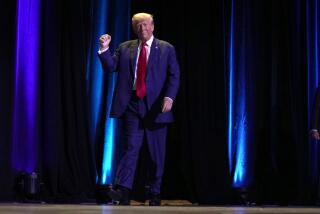Appeals Court Opens Way to Indict Deaver
- Share via
WASHINGTON — A federal appellate court Tuesday dissolved a temporary order that had prevented the indictment of former White House aide Michael K. Deaver, rejecting Deaver’s challenge to the legal authority of independent counsel Whitney North Seymour Jr. to prosecute him.
In making its brief ruling, however, a panel of three judges sidestepped the larger issue of whether court-appointed independent counsels like Seymour have the constitutional authority to investigate and prosecute present or former government officials.
Rather, the appellate judges dismissed Deaver’s challenge on procedural grounds, declaring only that President Reagan’s former close aide and confidant had mounted “an impermissible preemptive civil challenge to a criminal proceeding.” The judges added: “We express no opinion on the merits of (Deaver’s) constitutional arguments.”
Challenges to the authority of court-appointed independent counsels have been based on the argument that the power to investigate and prosecute belongs exclusively to the executive branch of government and may not be shared with Congress and the courts, as provided by the 1978 Ethics in Government Act, under which such independent counsels are appointed.
Late Tuesday, Deaver’s lawyers asked the Supreme Court to review the constitutional challenge to Seymour’s authority. But, barring an 11th-hour intervention by Chief Justice William H. Rehnquist, who has jurisdiction over emergency appeals from the District of Columbia, Seymour is expected to seek a four-count perjury indictment of Deaver from a federal grand jury, perhaps today.
Since his appointment last May, Seymour has been investigating allegations that Deaver violated federal conflict-of-interest laws by lobbying his former White House colleagues on behalf of business clients immediately after leaving the government in 1985.
Law Curbs Lobbying
The Ethics in Government Act bars former high government officials like Deaver from approaching their former colleagues on business matters for 12 months. The prohibition extends for longer periods in cases in which the former official had direct supervision over a particular matter while in government or had “personal and substantial” involvement in it.
In issuing its ruling, the appeals court sided with Seymour, who had argued that Deaver’s case was not “ripe” for decision because he had not yet been indicted.
“It is an established rule of federal law that courts will not review ongoing governmental action prior to its completion unless . . . serious and irremediable injury will result if the issue is not resolved promptly,” Seymour told the court.
The Court of Appeals still must rule on a similar constitutional challenge by attorneys for Lt. Col. Oliver L. North to the Iranian arms investigation of independent counsel Lawrence E. Walsh, in which North is a principal figure.
In that case, U.S. District Judge Barrington D. Parker last week rejected North’s challenge on grounds that it was “not ripe for decision,” a ruling immediately appealed by North’s lawyers. Parker held that “the nation demands an expeditious and complete disclosure of our government’s involvement in the Iran- contra affair.”
Sought Restraining Order
Deaver’s challenge began Feb. 25, when he asked U.S. District Judge Thomas Penfield Jackson for a temporary restraining order pending a ruling on his contention that Seymour lacked the legal power to prosecute him.
Jackson granted the temporary order but decided last week that Deaver’s challenge should be denied. However, Jackson said he would welcome an appellate court review of the question, and Deaver’s attorneys obtained a five-day order further blocking Seymour pending a decision by the appeals court. That order expired Tuesday.
More to Read
Sign up for Essential California
The most important California stories and recommendations in your inbox every morning.
You may occasionally receive promotional content from the Los Angeles Times.













